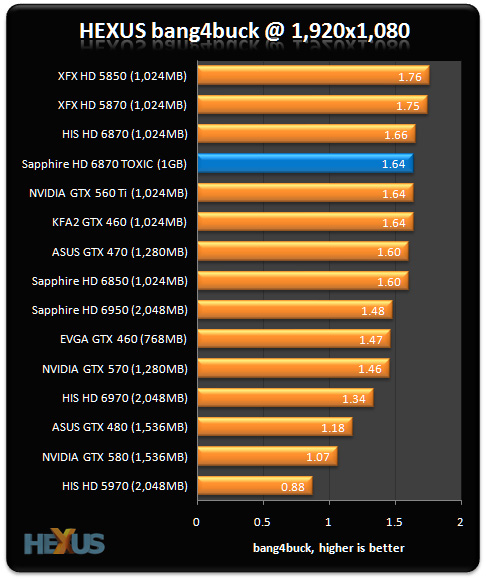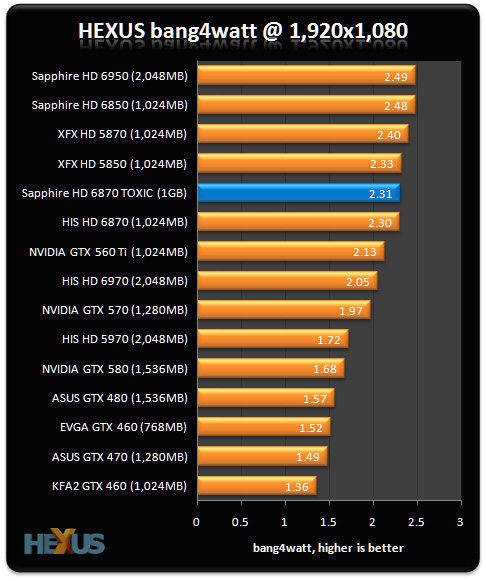HEXUS bang4buck and HEXUS bang4watt
Putting all the numbers into perspective, let's take a closer look at overall performance.
In a rough-and-ready assessment of the cards' bang for buck, we've aggregated the 1,920x1,080 frame-rates for seven games, normalised them* and taken account of the single-cards' prices.
But there are more provisos than we'd care to shake a stick at. We could have chosen seven different games, the cards' prices could have been derived from other sources and pricing tends to fluctuate daily, especially for new-release GPUs.
Consequently, the table below highlight a metric that should only be used as a yardstick for evaluating comparative performance with price factored in. Other architectural benefits are not covered, obviously.
| Aggregate FPS (1,920x1,080) |
Normalised* FPS (1,920x1,080) |
Current pricing | bang4buck (1,920x1,080) |
Power consumption** | bang4watt*** (1,920x1,080) |
|
|---|---|---|---|---|---|---|
| HIS Radeon HD 5970 2,048MB | 524.20 | 442.10 | £500 | 0.88 | 257 | 1.72 |
| HIS Radeon HD 6970 2,048MB | 413.10 | 375.75 | £280 | 1.34 | 183 | 2.05 |
| Sapphire Radeon HD 6950 2,048MB | 375.60 | 341.30 | £230 | 1.48 | 137 | 2.49 |
| Sapphire Radeon HD 6870 TOXIC 1,024MB | 365.60 | 328.50 | £200 | 1.64 | 142 | 2.31 |
| HIS Radeon HD 6870 1,024MB | 328.40 | 289.70 | £175 | 1.66 | 126 | 2.30 |
| Sapphire Radeon HD 6850 1,024MB | 288.40 | 240.60 | £150 | 1.60 | 97 | 2.48 |
| XFX Radeon HD 5870 1,024MB | 365.00 | 333.30 | £190 | 1.75 | 139 | 2.40 |
| XFX Radeon HD 5850 1,024MB | 312.60 | 272.40 | £155 | 1.76 | 117 | 2.33 |
| NVIDIA GeForce GTX 580 1,536MB | 494.20 | 422.60 | £395 | 1.07 | 252 | 1.68 |
| NVIDIA GeForce GTX 570 1,280MB | 436.90 | 385.95 | £265 | 1.46 | 196 | 1.97 |
| ASUS GeForce GTX 480 1,536MB | 432.60 | 384.20 | £325 | 1.18 | 244 | 1.57 |
| ASUS GeForce GTX 470 1,280MB | 348.90 | 304.45 | £190 | 1.60 | 204 | 1.49 |
| NVIDIA GeForce GTX 560 Ti 1,024MB | 374.10 | 328.65 | £200 | 1.64 | 154 | 2.13 |
| KFA2 GeForce GTX 460 1,024MB | 286.70 | 229.75 | £140 | 1.64 | 169 | 1.36 |
| EVGA GeForce GTX 460 768MB | 262.40 | 198.00 | £135 | 1.47 | 130 | 1.52 |
* the normalisation refers to taking playable frame rate into account. Should a card benchmark at over 60 frames per second in any one game, the extra fps count as half. Similarly, should a card benchmark lower, say at 40fps, we deduct half the difference from its average frame rate and the desired 60fps, giving it a HEXUS.bang4buck score of 30 marks. The minimum allowable frame rate is 20fps but that scores zero.
** the GPU power consumption is derived from subtracting a flat rate of 100W - indicating system power-draw without a card - from the Call of Duty: Black Ops load figure. While this figure isn't solely indicative of power pulled by the GPU, as the CPU also throttles up, it's a better metric than using peak system-draw alone.
*** the HEXUS.bang4watt score is a crude measurement of how much normalised performance the GPU provides when evaluated against GPU power-draw that's shown in the table: the former is divided by the latter. We're using the peak power-draw numbers obtained by running real-world Call of Duty: Black Ops.
Analysis

GTX 560 Ti and HD 6870 TOXIC are practically inseparable on the performance front. At their respective £200 price points, both offer an excellent performance-per-pound ratio and are kept from the top of the chart by end-of-life parts available at bargain prices. Radeon HD 5850 and 5870 remain tasty prospects if you can find them in stock at £155 and £190, respectively.

But while performance is tied, the cards can be separated on other fronts. Sapphire's 6870 TOXIC has the edge over GTX 560 Ti in the power department, but that advantage might be negated by noise - the latter of the two cards is quieter.









